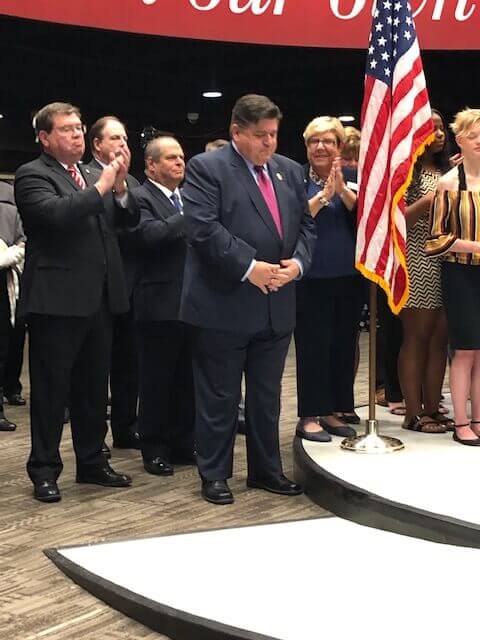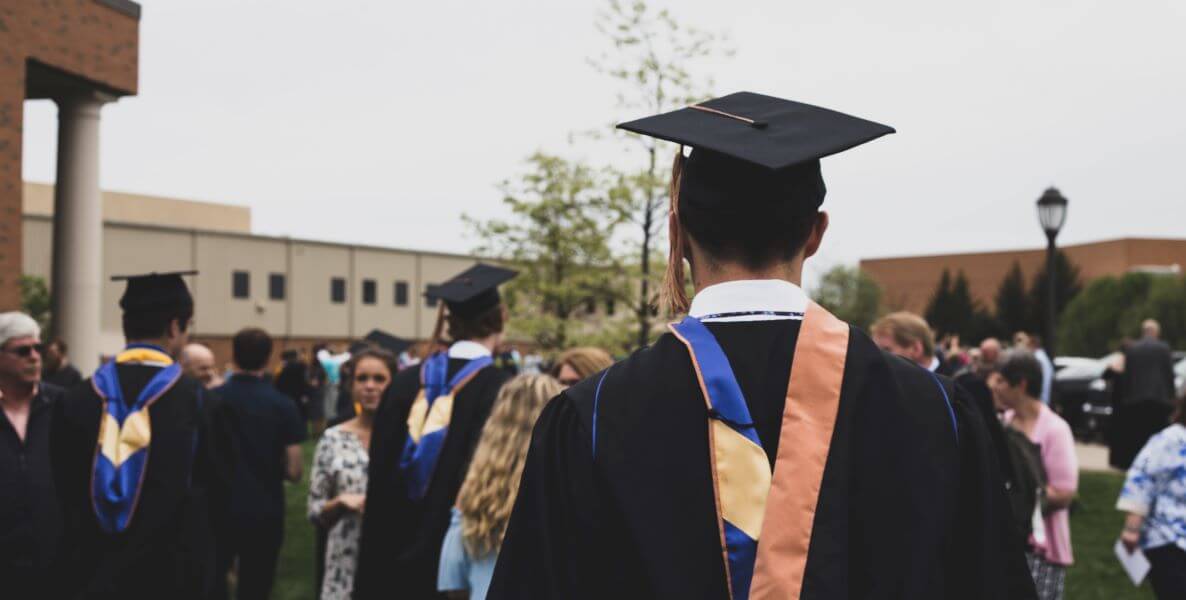Early in 2019, soon after J.B. Pritzker was elected governor of Illinois, he joined his deputy governor for higher education in a meeting with the presidents of Illinois’s public universities—including Governors State University, where I was president at the time.
At one point, Pritzker sought our opinion on a conversation he’d had with the governor of Louisiana, John Bel Edwards, at a conference for state leaders. Gov. Edwards told him that Louisiana had seen a sizable increase in college applications after they passed a law making it mandatory for high school seniors to fill out the Free Application for Student Assistance—otherwise known as FAFSA—which makes students eligible for scholarships, grants and other financial aid.
Pennsylvania has a long history of inadequate support for public higher education.
My colleagues and I enthusiastically supported Governor Pritzker’s idea of requiring the FAFSA in Illinois, as well. And on August 2, 2019, we stood behind him as he signed Public Act 101-180, requiring that “beginning with the 2020-21 school year, public high school students must complete the FAFSA or, as eligible, the Alternative Application for Illinois Financial Aid, as a prerequisite to receiving a high school diploma.” The law provides a waiver provision for opting out. But the law does something enormously important: It makes filling out the FAFSA normative.
As it stands in many states, including Pennsylvania, students often do not fill out the FAFSA because they don’t know that grant funding (money you don’t have to pay back) exists. Some do not fill it out because they assume, erroneously, that their family’s finances exceed the eligibility requirements. Most students do not realize that the FAFSA is also obligatory for state and some private funding.
The graduation requirement also helps dispel irrational fears, rumors and fake news. Some families, for example, fear sharing their IRS information, which is required on the form. Requests to opt out for that reason can be addressed, and families can be assured confidentiality, which increases participation.
In Illinois, ISAC (Illinois Student Assistance Commission) assumed major responsibility for support of the FAFSA mandate. In addition, Illinois public university presidents, who felt shared ownership of the new provision, were ready to double down on existing efforts to assist local high schools in FAFSA education.
And for good reason: Completion of the FAFSA is one of the strongest predictors of college enrollment. Many students do not pursue post-secondary education because of (valid) financial fears. When they are aware of available financial resources, they are more likely to make plans for education beyond high school.
As the Chronicle of Higher Education wrote last month, nearly 50 percent of the Class of 2021 failed to complete the FAFSA, leaving $3.75 billion in federal Pell grants unclaimed. A growing number of states have decided to join Louisiana and Illinois in making the FAFSA mandatory. Alabama and Texas are implementing the requirement for the first time in 2021-22. New Hampshire’s new law will take effect in 2023-24. More than a dozen states are considering similar bills, according to the Education Commission of the States.

The first year the Illinois FAFSA mandate was in effect (2020-21) coincided with the depths of the Covid lockdown. While FAFSA filings decreased just about everywhere, it’s clear that more Illinois students filled out the form because of the requirement than they would have done otherwise. In Louisiana in the first year of implementation, 26 percent more high school seniors completed the FAFSA; and Alabama and Texas lead the country in year over year increase, according to the Chronicle.
Pennsylvania, where are we?
Pennsylvania has a long history of inadequate support for public higher education. Education appropriations per FTE (full-time equivalent students) have decreased 43.8 percent since 1980, according to the nonprofit State Higher Education Finance, and 48 percent from 2001 to 2020.
As it stands in many states, including Pennsylvania, students often do not fill out the FAFSA because they don’t know that grant funding (money you don’t have to pay back) exists.
With this poor record of support, is it any wonder that the Philadelphia school system is scrambling to hire 900 teachers this fall? Well-funded universities prepare great teachers. What about other essential jobs that require higher education?
The situation is dire. Nationally, in 2022, nearly one million students have left the higher education pipeline because of Covid mayhem and a strong job market. Enrollment in Pennsylvania public universities has dropped 12 percent (219,113 students) from fall 2019 to fall 2021. That’s bad, for students’ long-range career prospects and for the public good of the Commonwealth.
Filling out the FAFSA alone will not get more students into college; for one thing, a researcher who studied Louisiana’s program notes, it does not help them apply to schools, or know what other funding schools might have. For that, you need more high school counselors and better ways to get information to students.
Here are some other ways we could make college more accessible to more students:
-
- Support President Biden’s plan to increase minimum Pell grants by $2175, bringing potential assistance for low-income students to $8,670 per year. Even better, lobby for Biden’s State of the Union proposal to double the Pell minimum to about $13,000 per year. Doing that would cover tuition at most community colleges and regional public universities.
- Applaud President Biden’s extension of the moratorium on student debt repayment until August 31, 2022, along with provisions for a ‘fresh start’ for student-loan borrowers. The administration will allow millions of borrowers who are behind on their payments or in default to re-enter payments without the punitive measures previously enacted.
- Remind public servants that they are eligible for college loan forgiveness after 10 years of employment. Lobby to reduce the employment requirement to five years. This is a benefit to the graduates that also helps bring energetic new blood to government jobs.
- Consider this interesting proposal to hold student borrowers responsible only for the principle of their student loans, not the interest.
- Carefully observe what New Mexico is doing in offering tuition-free higher education for all state residents. A new state law, passed with bi-partisan support, according to The New York Times “allocates 1 percent of the state’s budget toward covering tuition and fees at public colleges and universities, community colleges and tribal colleges. All state residents from new high school graduates to adults enrolling part-time will be eligible regardless of family income. The program is also open to immigrants regardless of their immigration status…New Mexico’s law goes further by covering tuition and fees before other scholarships and sources of financial aid are applied, enabling students to use those other funds for expenses such as lodging, food or child care.” Wow!! Democrats and Republicans in New Mexico truly understand the significance of higher education as a public good. I wish Pennsylvania would steal this idea.
- Question candidates for PA governor and legislature on their support for higher education
Compare the unfortunate plight of poorly supported Pennsylvania students to the encouragement received by the lucky ones in New Mexico—and the encouragement of states like Louisiana and Illinois. Pennsylvania will never be great without bi-partisan support for post-secondary education, enabling all Commonwealth citizens to meet their highest potential for personal achievement and engaged citizenship.
Elaine Maimon, PhD, is author of Leading Academic Change: Vision, Strategy, Transformation. Her co-authored book, Writing in the Arts and Sciences, has been designated as a landmark text https://wac.colostate.edu/books/landmarks/maimon/. She is a Distinguished Fellow of the Association for Writing Across the Curriculum. Follow @epmaimon on Twitter.
 The Citizen is one of 20 news organizations producing Broke in Philly, a collaborative reporting project on solutions to poverty and the city’s push towards economic mobility. Follow the project on Twitter @BrokeInPhilly.
The Citizen is one of 20 news organizations producing Broke in Philly, a collaborative reporting project on solutions to poverty and the city’s push towards economic mobility. Follow the project on Twitter @BrokeInPhilly.
![]() RELATED STORIES ABOUT HIGHER EDUCATION
RELATED STORIES ABOUT HIGHER EDUCATION
Photo by Charles DeLoye on Unsplash




